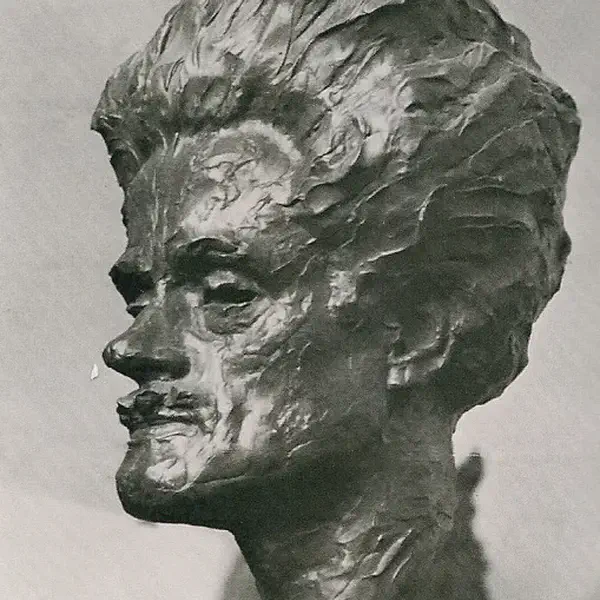
Author and Poet C M Grieve (Hugh MacDiarmid) Born at Langholm, Dumfriesshire.
August 11, 1892
C. M. Grieve, better known by his pen name Hugh MacDiarmid, was born on August 11, 1892, in Langholm, Dumfriesshire, Scotland. He is widely regarded as one of Scotland’s greatest 20th-century poets and a central figure in the Scottish literary renaissance.
Early Life and Education
Birth and Background: Christopher Murray Grieve, later known as Hugh MacDiarmid, was born in the small town of Langholm in the Scottish Borders. His father was a postman, and his mother a dressmaker. Grieve grew up in a bilingual environment, speaking both English and Scots, which would profoundly influence his later work.
Education and Early Career: Grieve attended Langholm Academy and later enrolled in Edinburgh University, though he did not complete his studies. He worked as a journalist in various towns across Scotland and England, developing a deep interest in literature and politics.
Literary Career and the Scottish Renaissance
Hugh MacDiarmid: Adopting the pen name Hugh MacDiarmid, Grieve became the leading figure in the Scottish literary renaissance, a movement that sought to revive and modernize Scottish literature. MacDiarmid aimed to create a new, distinctly Scottish literary voice that embraced both the country’s rich traditions and contemporary modernist techniques.
“A Drunk Man Looks at the Thistle”: MacDiarmid’s most famous work, A Drunk Man Looks at the Thistle (1926), is a long poem written in Scots that explores themes of national identity, politics, and cultural renewal. The poem is considered a masterpiece of modernist poetry and a cornerstone of 20th-century Scottish literature.
Language and Innovation: MacDiarmid was passionate about the use of the Scots language in literature, believing it was key to expressing the Scottish experience. He combined this linguistic nationalism with an embrace of modernist experimentation, creating a body of work that was both deeply rooted in Scottish culture and engaged with international literary trends.
Political Involvement
Political Beliefs: MacDiarmid was a committed socialist and Scottish nationalist, and these beliefs were central to his work. He was a founding member of the National Party of Scotland (which later became the Scottish National Party, or SNP) and was involved in left-wing politics throughout his life.
Controversy and Influence: MacDiarmid’s political views and outspoken personality often led to controversy. He was expelled from the Communist Party for his nationalist views and later from the SNP for his communist sympathies. Despite this, his work continued to influence both the literary and political landscapes in Scotland.
Later Life and Legacy
Continued Writing: MacDiarmid continued to write prolifically throughout his life, producing poetry, essays, and political commentary. His later works include The Kind of Poetry I Want (1961) and In Memoriam James Joyce (1955). His later poetry, often written in English, tackled a wide range of subjects, from science and philosophy to international politics.
Recognition: MacDiarmid’s contributions to Scottish literature were widely recognized during his lifetime and after his death. He was awarded numerous honors, including the Queen’s Gold Medal for Poetry in 1954. Today, he is remembered as one of Scotland’s most important literary figures.
Death: Hugh MacDiarmid passed away on September 9, 1978, in Edinburgh. He was buried in Langholm, the town of his birth, where a memorial stands in his honor.
Legacy
Cultural Impact: Hugh MacDiarmid is celebrated for his role in revitalizing Scottish literature and for his efforts to establish a modern Scottish cultural identity. His work has inspired generations of writers and poets and remains a touchstone for discussions about Scottish language, literature, and identity.
Influence on Modern Scottish Literature: MacDiarmid’s influence can be seen in the work of many later Scottish writers, including Edwin Morgan, Norman MacCaig, and Liz Lochhead. His blending of modernism with a deep appreciation of Scottish tradition set a precedent for the development of contemporary Scottish literature.
Hugh MacDiarmid’s birth in Langholm, Dumfriesshire, marked the beginning of a life dedicated to exploring and redefining Scottish culture through literature. His legacy as a poet, cultural nationalist, and intellectual continues to shape Scotland’s literary and cultural landscape today.